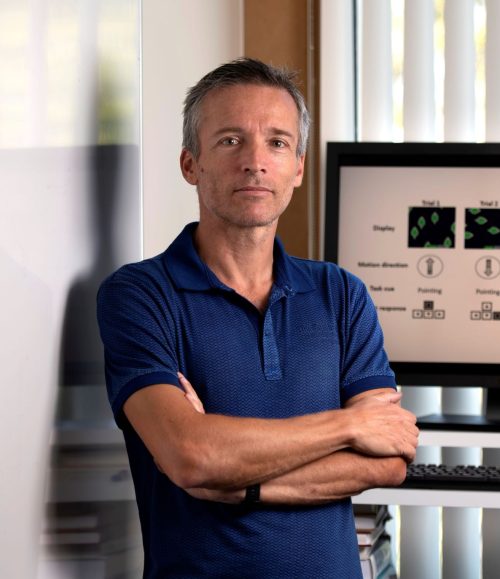|
Department of Cognitive Sciences
|
 |
|---|
Research
My research in cognitive science is primarily concerned with high-level cognition. Through empirical studies and computational modeling, the goal is to understand how people self-reflect, learn, and make decisions. These insights into human intelligence can help us advance not only cognitive science and psychology but also AI research. In my main research thread, I investigate how humans can collaborate with AI/machine learning models to amplify and augment human decision-making. My goal as a cognitive science researcher is to consider the role of human cognition in developing human-AI collaborative systems that optimize for human interaction and team performance. My research in this area also includes the development of new AI capabilities such as mental models (e.g., how can an AI build a mental model of a human so it can better understand how and when to help) and metacognition (e.g., how can an AI assess its own knowledge limitations and communicate those limitations to a human?).
Representative Publications
Steyvers, M., & Peters, M.A.K. (2025). Metacognition and uncertainty communication in humans and large language models. Current Directions in Psychological Science. [pdf]
Steyvers, M. & Kumar, A. (2024). Three challenges for AI-Assisted Decision-Making. Perspectives on Psychological Science, 19, issue 5, 722-734. [pdf]
Steyvers, M., Tejeda, H., Kumar, A., Belem, C., Karny, S., Hu, X., Mayer, L., & Smyth, P. (2025). What Large Language Models Know and What People Think They Know. Nature Machine Intelligence, 7, 221-231. [pdf][supporting information][data and code]
Kumar, A., Smyth, P., & Steyvers, M. (2023). Differentiating mental models of self and others: A hierarchical framework for knowledge assessment. Psychological Review, 130(6), 1566–1591 [pdf][data and code]
Tejeda, H., Kumar, A., Smyth, S., & Steyvers, M. (2022). AI-Assisted Decision-Making: A Cognitive Modeling Approach to Infer Latent Reliance Strategies. Computational Brain and Behavior, 5, 491–508. [pdf][data and code]
Steyvers, M., Tejeda, H., Kerrigan, G., & Smyth, P. (2022). Bayesian Modeling of Human-AI Complementarity. Proceedings of the National Academy of Sciences, 119(11), e2111547119, 1-7. [pdf][supporting information][data and code]
Kerrigan, G., Smyth, P., & Steyvers, M. (2021). Combining Human Predictions with Model Probabilities via Confusion Matrices and Calibration. Advances in Neural Information Processing Systems (NeurIPS), 35. [pdf]
Steyvers, M., Schafer, R.J. (2020). Inferring Latent Learning Factors in Large-Scale Cognitive Training Data. Nature Human Behaviour, 4, 1145-1155. [pdf][supporting information][data and code]
Steyvers, M., Hawkins, G.E., Karayanidis, F., & Brown, S.D. (2019). A large-scale analysis of task switching practice effects across the lifespan. Proceedings of the National Academy of Sciences, 116(36), 17735-17740. [pdf][supporting information][data and code]
Steyvers, M. and Benjamin, A.S. (2019). The joint contribution of participation and performance to learning functions: Exploring the effects of age in large-scale data sets. Behavior Research Methods, 51(4), 1531-1543. [pdf][code]
Bennett, S.T., Benjamin, A.S., Mistry, P.K., and Steyvers, M. (2018). Making a wiser crowd: Benefits of individual metacognitive control on crowd performance. Computational Brain and Behavior, 1, 90-99. [pdf][data]
Tauber, S., Navarro, D.J., Perfors, A., & Steyvers, M. (2017). Bayesian models of cognition revisited: Setting optimality aside and letting data drive psychological theory. Psychological Review, 124(4), 410-441. [pdf]
Hemmer, P. & Steyvers, M. (2009). A Bayesian Account of Reconstructive Memory. Topics in Cognitive Science, 1, 189-202. [pdf]
Robinson, M. & Steyvers, M. (2023). Linking computational models of two core tasks of cognitive control. Psychological Review, 130(1), 71–101 [pdf][data and code]
Professional Bio
Mark Steyvers is a Professor and Chair of Cognitive Sciences at UC Irvine. He has a joint appointment with the Computer Science department and is affiliated with the Center for Machine Learning and Intelligent Systems. His publications span work in cognitive science as well as machine learning and has been funded by NSF, NIH, IARPA, NAVY, and AFOSR. He received his PhD from Indiana University and was a Postdoctoral Fellow at Stanford University. He is currently serving as Associate Editor of Computational Brain and Behavior and Consulting Editor for Psychological Review and has previously served as the President of the Society of Mathematical Psychology, Associate Editor for Psychonomic Bulletin & Review and the Journal of Mathematical Psychology. In addition, he has served as a consultant for a variety of companies such as eBay, Yahoo, Netflix, Merriam Webster, Rubicon and Gimbal on machine learning problems. Dr. Steyvers received New Investigator Awards from the American Psychological Association as well as the Society of Experimental Psychologists. He also received an award from the Future of Privacy Forum and Alfred P. Sloan Foundation for his collaborative work with Lumosity.